| | | | | | | Presented By Babbel | | | | Axios World | | By Dave Lawler · Jun 02, 2022 | | Welcome back to Axios World. - Tonight's edition (1,867 words, 7 minutes) comes to you from Zurich, where I've spent the last week after a positive COVID test prevented me from returning to the U.S. It's a lovely city.
- Tomorrow is the 100th day of the war in Ukraine. That's where we start.
| | | | | | 1 big thing: 100 days of war | 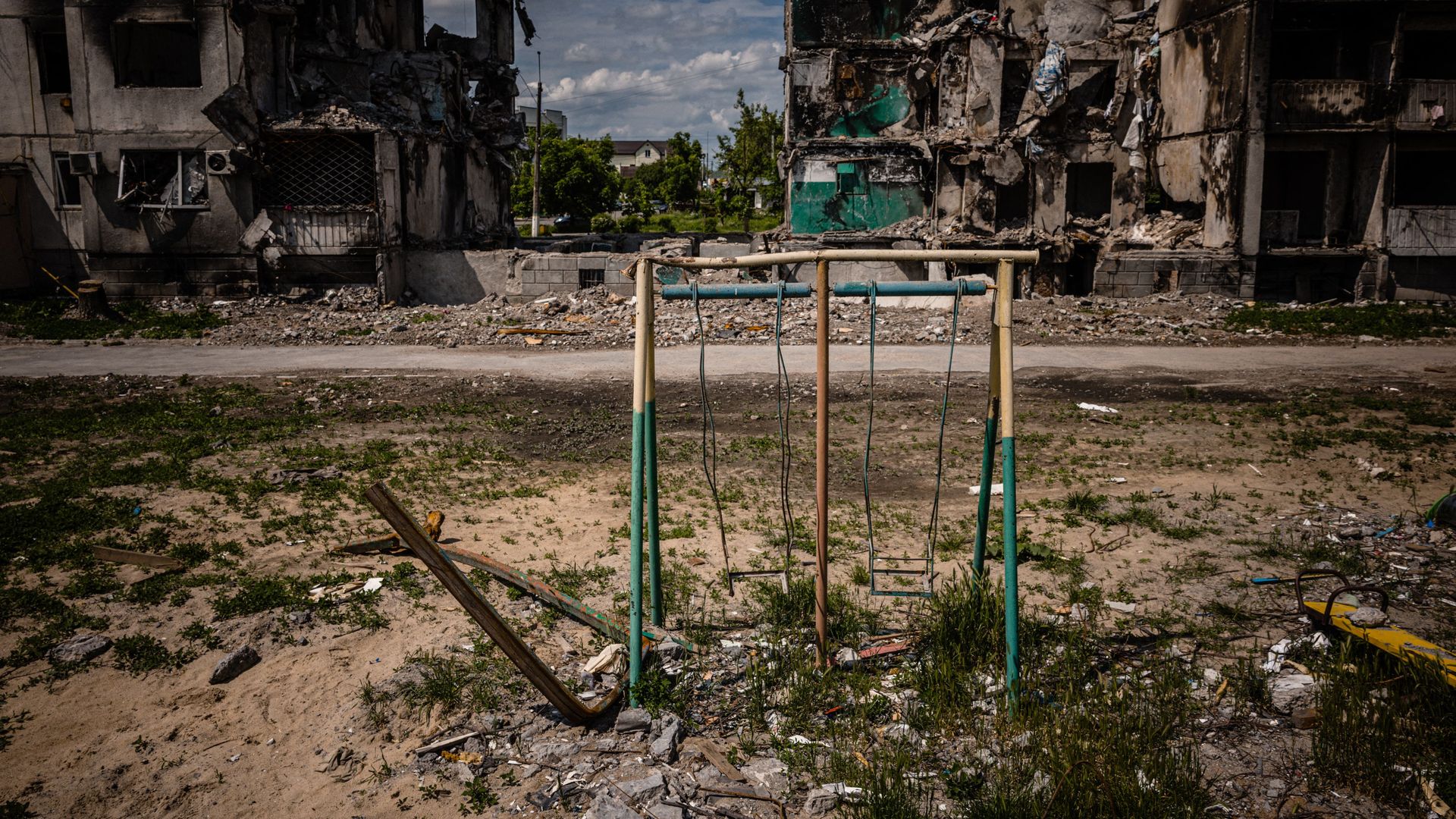 | | | A scene from Borodyanka, Ukraine, this week. Photo: Dimitar Dilkoff/AFP via Getty | | | | 100 days into the war, it's no longer so simple to argue that Vladimir Putin is losing. The big picture: The massive Russian offensive in the east is progressing gradually but relentlessly. Russia is moving to complete the capture of Luhansk, the northern half of the Donbas, which would bring Putin closer to his stated goal of "liberating" all of the region. Driving the news: Russian forces have reportedly taken most of the key city of Severodonetsk in the past few days — surprisingly quick progress given Ukraine's previous success in urban warfare. - Russia is turning towns into rubble before taking them. Ukrainian Foreign Minister Dmytro Kuleba has described the battle as reminiscent of World War II — tanks, artillery and grueling fights for territory.
- Russia is also inflicting heavy casualties on Ukraine's best-trained forces, which are concentrated in the Donbas. Ukrainian President Volodymyr Zelensky says Ukraine is losing 60–100 soldiers per day, and Russia now controls 20% of Ukraine's territory.
On the ground: Cpl. Andrii Shadrin, a Ukrainian soldier fighting in Luhansk, tells Axios the Russians have a seemingly inexhaustible supply of artillery and armored vehicles. - While they're often using older weaponry and inaccurate artillery, he says, they are still able to flatten everything in their path.
- "They just need to capture the land. I don't even think they know what to do with the territory they capture," he says.
- Asked how big a difference the long-range rocket systems President Biden has promised will make, Shadrin says, "We need f---ing everything."
Yes, but: Many military analysts believe Russia's ability to push forward will be exhausted relatively soon, potentially giving Ukraine — which will be able to pull in reserve forces and Western weaponry — an opportunity to counterattack and reclaim territory as the summer drags on. - But it's also possible Putin will again expand his targets beyond the Donbas, after his initial offensives on Kyiv and other cities collapsed. Russian forces seem to be adapting to those earlier failures.
- In any event, Russia's recent progress has at least temporarily dampened the speculation that Ukraine will be able to chase Russia back to the pre-invasion lines, or out of the country entirely.
- "This is a battle of national will. You have tens of thousands, hundreds of thousands of men mobilized on each side. It is a grinding, hard conflict, and it's likely to ... stretch on for a long time," U.S. Undersecretary of Defense Colin Kahl said Wednesday while announcing the shipment of HIMARS rocket launchers to Ukraine.
 State of play: German Chancellor Olaf Scholz and French President Emmanuel Macron have kept up their calls to Kyiv and Moscow in hopes of generating some momentum for diplomacy. - Meanwhile, Biden wrote in the NYT that his objective is to put Ukraine "in the strongest possible position at the negotiating table" by helping strengthen its position on the battlefield.
- Zelensky has shown no inclination to accept a deal that cedes more territory to Russia. Putin has been unwilling to talk to Zelensky at all, and his spokesperson Dmitry Peskov accused Biden of "pouring oil on the fire" with its latest weapons shipment.
- It currently seems likely that a war that has lasted 100 days could drag on for hundreds more.
What to watch: A protracted conflict will reverberate ever more strongly through the global economy. World leaders and international organizations are sounding the alarm about how continued fighting, Russian blockades and Western sanctions will devastate the global food supply. |     | | | | | | 2. The view from Moscow: 100 days of the "special military operation" | 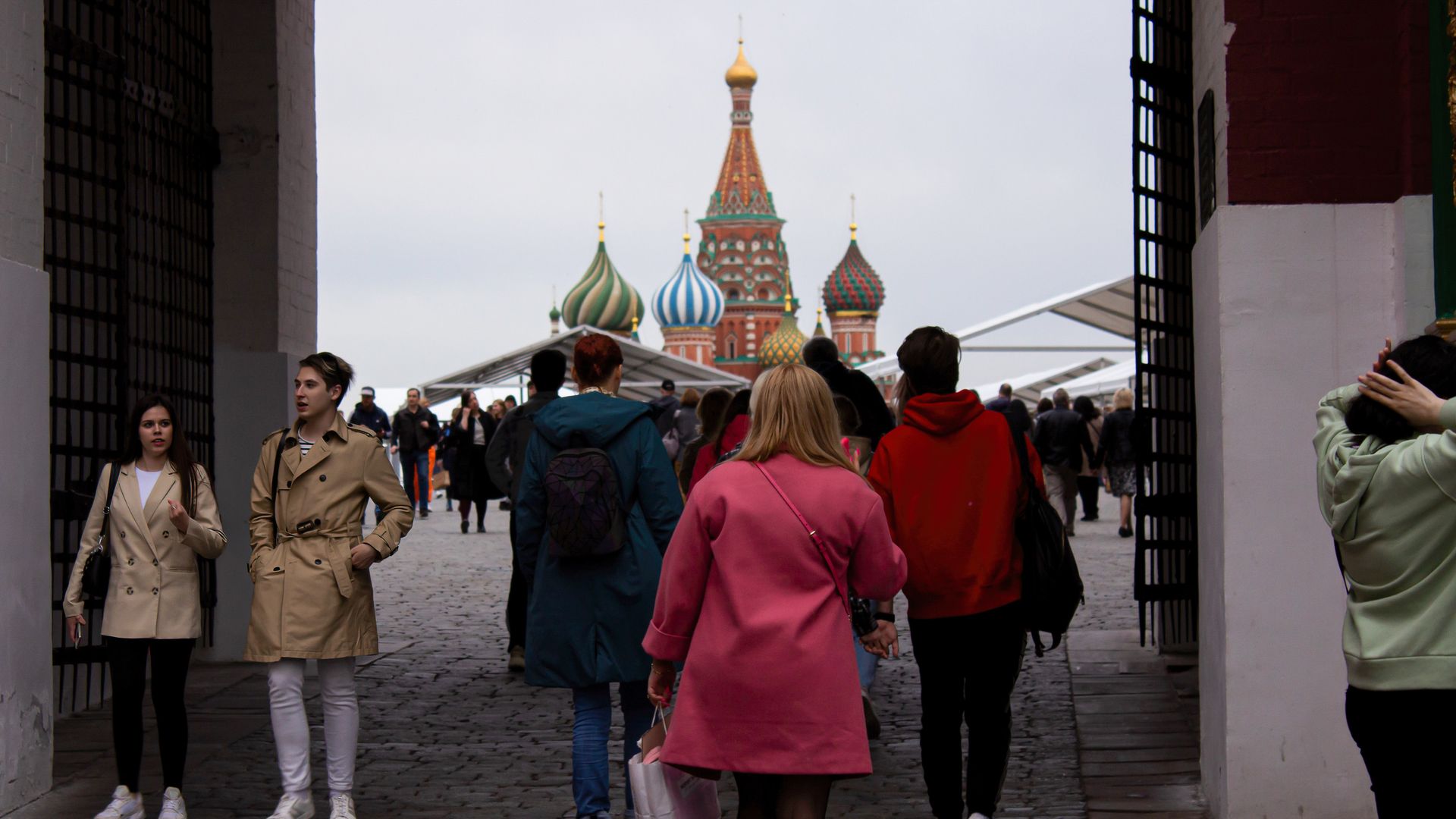 | | | Red Square, Moscow, this week. Photo: Vlad Karkov/SOPA Images/LightRocket via Getty | | | | Many Russians thought the "special operation" would be over within days. Then perhaps by Victory Day on May 9. "Now people don't have any time frames in mind, and there is less hope that it will be over soon," writes Yana, a journalist in Moscow: Flashback: "Before, I used to oppose the 'operation' actively: I went to the streets to protest, signed petitions and wrote letters to Parliament members. But it didn't seem effective, and there are no more massive rallies." - "Now, I am just trying to do a good job as a journalist, which is also not easy when objective reports can be considered 'fake news' and lead to imprisonment."
Zoom out: Inside Russia, public support for the war remains relatively steady at around 80%, says Denis Volkov, director of Russia's most-respected independent pollster, the Levada Center. - But Russians are increasingly viewing the conflict as against the West, rather than only against Ukraine, which "helps to mobilize support behind the regime," Volkov tells Axios.
In Yana's liberal circle, many friends "don't see their future in Russia anymore" and are leaving the country, she writes. - "Overall, liberal Russians are still frustrated, but they share fewer posts about it on social media compared to February or March." People are adjusting to life without Western brands and planning domestic summer holidays given the difficulty of traveling abroad.
- "It was tough to function in the constant stress first months, and now people have learned how to continue their lives and run errands in the new context."
- "They read less news and worry less, which is sad, but inevitable I guess."
Volkov says that's true of Russia as a whole. - "The first shock is gone and people are more preoccupied with adjusting to the new economic conditions."
|     | | | | | | 3. By the numbers: World moves on from Ukraine |  Data: NewsWhip; Chart: Axios Visuals Ukraine is entering the next 100 days of the war without the same international swell of support on social media as it had going into the first 100, according to NewsWhip data exclusively provided to Axios. Axios' Neal Rothschild reports: Why it matters: As attention wanes, so will the pressure on world leaders to help Ukraine and punish Russia. "To the people of the United States, do not get used to this war. ... Otherwise, we are risking a never-ending war ... Don't get used to our pain." — Ukrainian first lady Olena Zelenska to ABC NewsBy the numbers: There has been a 22-fold decrease in social media interactions (likes, comments, shares) on news articles published about Ukraine between the first week of the war and the most recent week. More headlines: |     | | | | | | A message from Babbel | | Learning language requires variety | | |  | | | | Everyone learns differently. Babbel offers a variety of study options so you can start speaking a new language in just three weeks. Find what works best for you — whether that's Babbel's lessons, games, videos, podcasts or live sessions. Get started now for up to 60% off your subscription. | | | | | | Bonus: Where in the world? | | Today we've got a grab bag. Can you name the... - Most sparsely populated country.
- Largest country by area.
- Largest landlocked country.
- Country with the highest average elevation.
- Country with the most inhabited islands.
- Newest country (by UN membership).
- Country with the highest life expectancy.
- Country with the most annual visits by tourists (pre-pandemic).
Scroll to the bottom for the answers. |     | | | | | | 4. Bickering ahead of the Summit of the Americas | 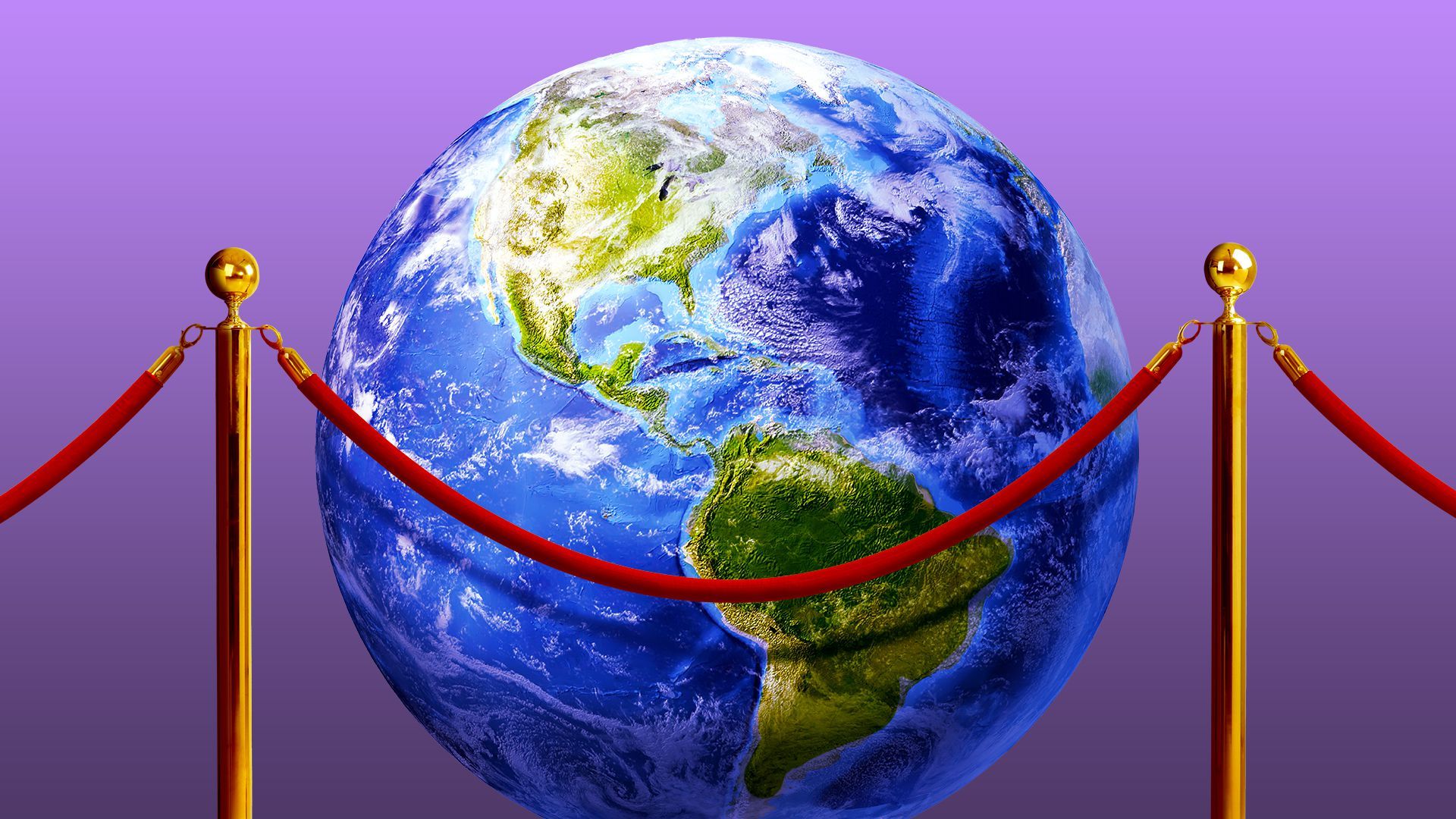 | | | Illustration: Sarah Grillo/Axios | | | | The Summit of the Americas is returning to the U.S. for the first time since 1994, but international squabbles over the guest list have overshadowed the preparations, Axios Latino co-author Marina E. Franco writes. Why it matters: Washington sees the summit, which starts Monday in LA, as a chance to strengthen ties to Latin America and the Caribbean, which have moved closer to China. - But Mexican President Andrés Manuel López Obrador and several other leaders have objected to the fact that the leaders of Cuba, Nicaragua and Venezuela were expected to be excluded. He hasn't said whether he'll attend.
- The White House claims the invite list isn't yet settled... four days before the summit begins.
Between the lines: Some observers warn that recent U.S. policy toward Latin America treats the region as if it were still just the nation's backyard instead of a partner. - "It's a mistake when [Washington] isn't offering a penny or specific initiatives as counterweight to what China offers while demanding the region not look to China," Wilson Center distinguished fellow Cynthia J. Arnson says.
- Juan Gabriel Tokatlian of Torcuato di Tella University in Argentina says the summit has "little specificity to the agenda, and a dearth of legwork," and beyond that, "relationship decline can't be fixed by a summit alone."
- Ahead of the summit, Uruguayan President Luis Lacalle Pou defended his outreach to China on trade in a BBC interview by saying the U.S. does "not have a vision of Latin America" that applies to countries like his.
What to watch: The Biden administration is expecting a commitment at the summit from Spain to resettle refugees from the Western Hemisphere for the first time ever, Axios' Stef Kight scoops. Go deeper. In other news: U.S. lifts Trump-era flight restrictions on Cuba |     | | | | | | 5. Global news roundup | 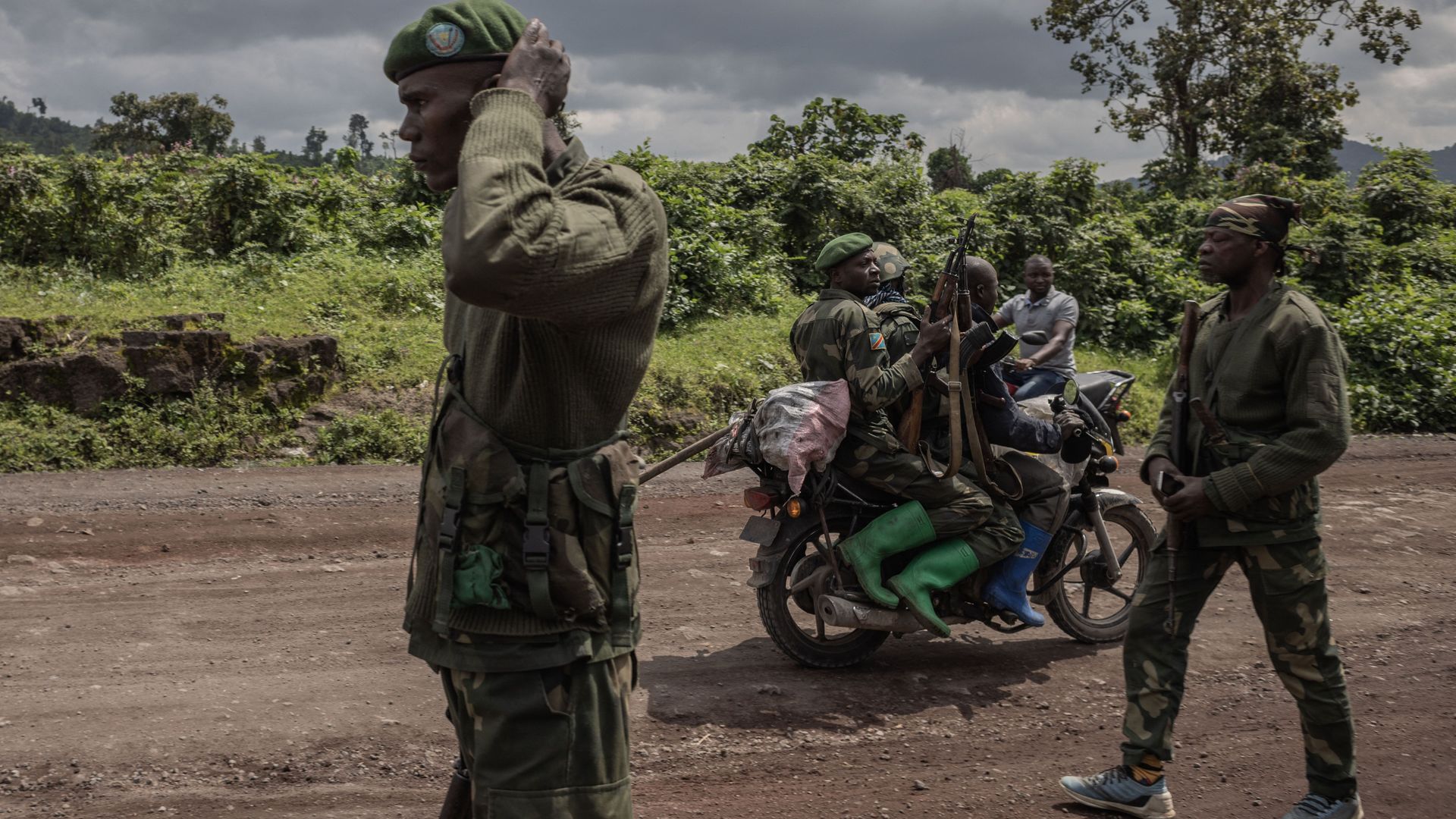 | | | Congolese army soldiers on patrol after an attack by M23 rebels near Goma. Photo: Guerchom Ndebo/AFP via Getty. | | | | 1. Colombia's presidential election took an unexpected twist on Sunday when Rodolfo Hernández, a populist businessman sometimes compared to Donald Trump, advanced to face leftist front-runner Gustavo Petro in a June 19 runoff. - Iván Duque, the unpopular conservative incumbent, is ineligible for re-election and his ideological successor failed to make the runoff. That means this will be the 14th consecutive free and fair election in Latin America to be won by the opposition, Oliver Stuenkel notes.
- Petro, an economist and former guerrilla who previously served as mayor of Bogotá, would be the country's first left-wing president if he wins.
2. Tensions between the Democratic Republic of Congo and neighboring Rwanda are heating up as the DRC and partner forces fight M23 rebels in the country's restive east. - The DRC has accused Rwanda of supporting the rebels. Rwanda, meanwhile, says another Congolese rebel group kidnapped two of its soldiers, has accused the DRC of firing rockets onto its territory, and threatened to send in troops.
- The big picture: "For years, the DRC's neighbors have used militias in its east — Congolese and foreign alike — as proxies. Rwanda and Uganda especially have long sought to exert influence in the area, whose abundant mineral resources buttress their economies," the International Crisis Group writes.
3. The World Health Organization on Wednesday said it assumes North Korea's coronavirus outbreak is "getting worse, not better," but severely lacks data from the country. 4. At a summit in Fiji last week, Beijing proposed a sweeping security and economic agreement for 10 Pacific island nations. None signed it, Axios' Bethany Allen-Ebrahimian writes. |     | | | | | | 6. Data du jour: Where the Queen reigns |  Data: Axios research; Map: Thomas Oide/Axios Queen Elizabeth II is celebrating 70 years on the throne this week, and she remains the monarch of 14 countries other than the U.K. These include Australia, Canada and nearly a dozen island states in the Caribbean and the Pacific. - She served as head of state in 18 additional countries back in 1952 that have since become republics. Barbados joined that club in November.
What to watch: With her reign likely nearing an end, other countries will likely reconsider their constitutions. - Australia's new prime minister, Anthony Albanese, notably appointed an "assistant minister for the republic" this week.
- Yes, but: Australians voted 55%/45% in 1999 to keep the monarchy, and Albanese has said another referendum won't be a top priority.
|     | | | | | | 7. Stories we're watching | 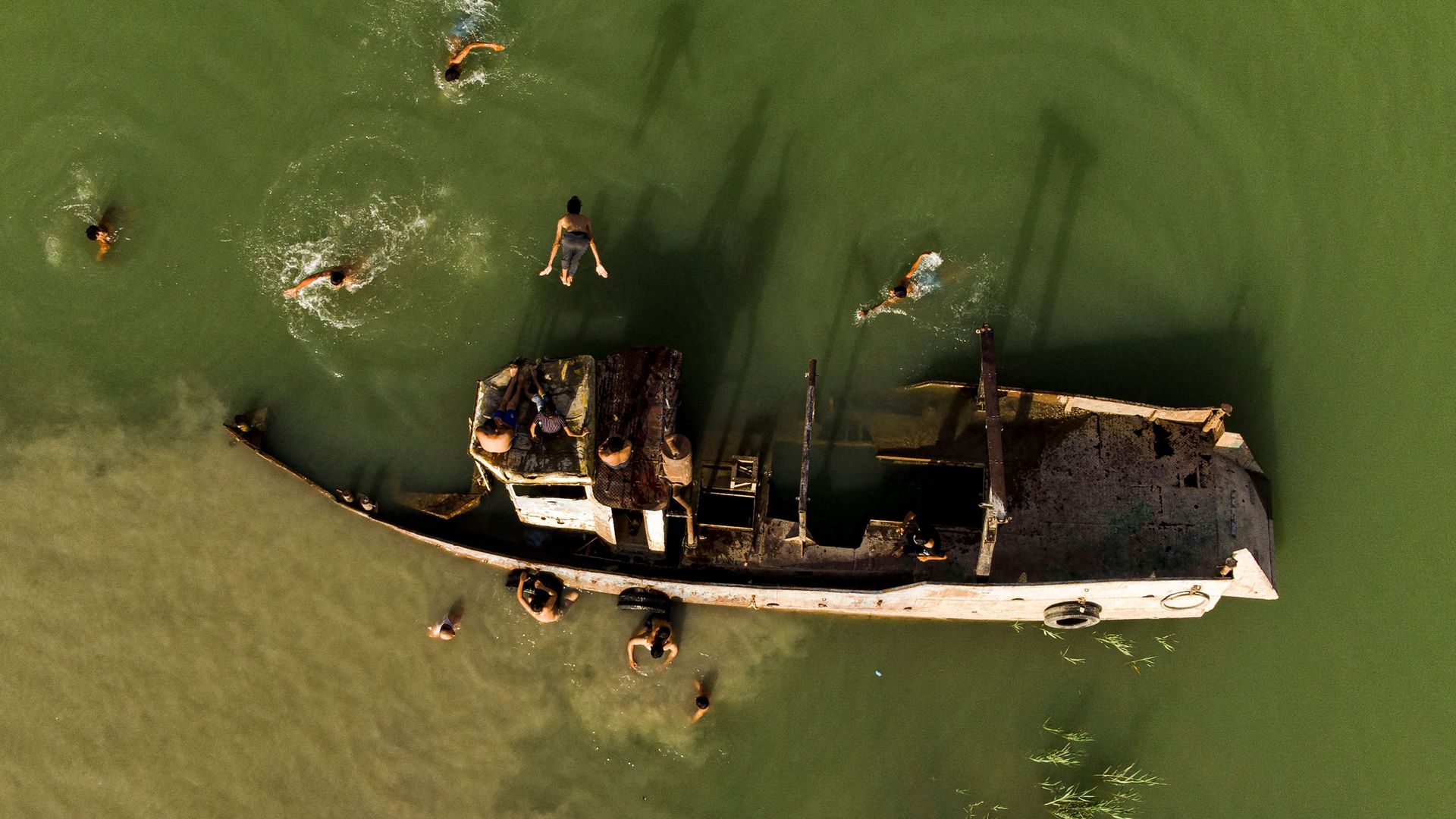 | | | Boys swim near a wrecked boat near the confluence of the Tigris and Euphrates rivers in Basra, Iraq. Photo: Hussein Faleh/AFP via Getty | | | - OPEC+ to boost production
- British Columbia to temporarily decriminalize drugs
- Mexico bans e-cigarettes
- Portugal and Spain at center of monkeypox outbreak
- Abbas presses Blinken over Israeli "provocations"
- Sri Lanka's debt crisis matters to the world
- Australia's diverse new Cabinet has record 13 women
- Egypt uncovers 250 mummies
- Monarch butterflies see resurgence in Mexico
Quoted: "We need only look south of the border to know that if we do not take action firmly and rapidly, it gets worse and worse and gets more difficult to counter." — Canadian Prime Minister Justin Trudeau, proposing sweeping new gun controls |     | | | | | | A message from Babbel | | Speak a new language in three weeks | | |  | | | | Babbel's language lessons were created by real language experts — not AI like other apps. The impact: Users report that they can hold a basic conversation in just three weeks of practice. For a limited time, try Babbel and get up to 60% off your subscription. | | | | Answers: 1. Mongolia; 2. Russia; 3. Kazakhstan; 4. Bhutan; 5. Indonesia; 6. South Sudan; 7. Japan; 8. France. Key: 1. Sparsest population; 2. Largest by area; 3. Largest landlocked; 4. Highest elevation; 5. Most inhabited islands; 6. Newest; 7. Highest life expectancy; 8. Highest tourism. |  | It's called Smart Brevity®. Over 200 orgs use it — in a tool called Axios HQ — to drive productivity with clearer workplace communications. | | | | | | Axios thanks our partners for supporting our newsletters. If you're interested in advertising, learn more here.
Sponsorship has no influence on editorial content. Axios, 3100 Clarendon Blvd, Suite 1300, Arlington VA 22201 | | | You received this email because you signed up for newsletters from Axios.
Change your preferences or unsubscribe here. | | | Was this email forwarded to you?
Sign up now to get Axios in your inbox. | | | | Follow Axios on social media:    | | | | | |












No comments:
Post a Comment